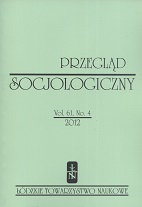PARTICIPATION AND LAND REFORM IN BRAZIL: TRACING CONNECTIONS BETWEEN BUREAUCRATS AND SOCIAL MOVEMENTS
PARTICIPATION AND LAND REFORM IN BRAZIL: TRACING CONNECTIONS BETWEEN BUREAUCRATS AND SOCIAL MOVEMENTS
Author(s): Camila PennaSubject(s): Social Sciences
Published by: Łódzkie Towarzystwo Naukowe
Keywords: INCRA; Bureaucracy; Actor-network theory; Participatory democracy; Brazil
Summary/Abstract: There are different forms by which the state bureaucracy relates to social movements in the realm of agrarian reform policies in Brazil. A number of possible connections and very complex relations have been taking shape over the last 30 years. Possible connections include institutional spaces for discussion, but also a number of informal relations between bureaucrats and social movement mediators. I would argue that the literature on participatory democracy is not the best approach to analyze this wide-ranging scope of connections, inasmuch as it assumes the existence of two different and separate actors - the state and the civil society – and usually considers the state as a monolithic actor while focusing on civil society. In fact, the diversity of formats by which social movements relate to state bureaucracy can be apprehended more fully by the actor-network approach, as this gives the researcher tools to account for connections taking place in different sites and in a multiplicity of formats, as well as to analyze their effects on actors’ agency during the political process. Data that supports this argument is drawn from ethnographical research within the Brazilian state institution in charge of implementing agrarian reform policies, INCRA (National Institute of Colonization and Agrarian Reform). By focusing on how the bureaucracy understands and reacts to one of the most organized and mobilized beneficiary publics in the Brazilian political arena, this investigation presents some interesting findings regarding the complexity of networks in which bureaucrats are entangled and their effects on the negotiation and implementation of policies claimed by rural social movements. In what follows I discuss some of these findings in light of participatory democracy and theoretical actor-network contributions.
Journal: Przegląd Socjologiczny
- Issue Year: 61/2012
- Issue No: 4
- Page Range: 123-142
- Page Count: 20
- Language: English

